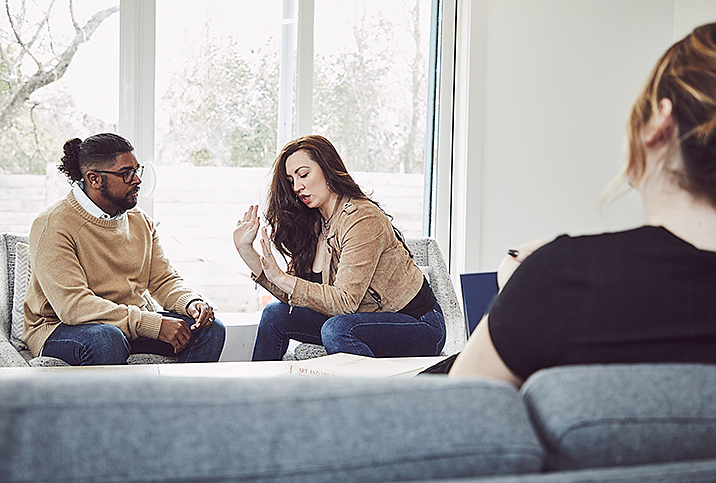Separate From Your Partner Respectfully With Breakup Therapy

You may have heard of premarital therapy or couple's therapy, which partners attend before or during their marriage. These forms of therapy are meant to prevent or fix a problem in someone's relationship. Additionally, it can help you determine if you should stay together or divorce, at which point a divorce therapist can guide you on how to split your assets, manage your emotions and handle custody if you have kids or other dependents.
Breakup therapy—also known as separation therapy—for non-married couples, on the other hand, is much less spoken about. It's typical for people to go to therapy by themselves to heal emotionally from a breakup. But what about therapy that involves both partners?
"Breakup therapy is common in couples looking to break up more easily and thoughtfully," said Barbara Santini, a psychologist, sex and relationship adviser. "It helps partners navigate through the separation process in various ways. It focuses on how they can fully let go of each other most respectfully. We help them deal with the emotional, anger, denial, grief and other negative feelings of breakups."
Why would couples seek breakup therapy?
After a breakup, have you ever wished you could have ended things differently or said something in a better way?
Breakup therapy addresses that need, allowing for a cleaner break for both partners involved who would like to end things amicably. In addition, if couples are on the fence about breaking up or have already broken up with their partner, breakup therapy can provide them with clarity and closure.
"Just because a couple isn't married does not mean that there is nothing to discuss," said Ashera DeRosa, a licensed marriage and family therapist in New York. "If they cohabitate and need to wait until their lease is up to move out, it's important to discuss how they can retain emotional safety while living together. If they share assets, they need to figure out how to divide them. If they co-parent, they need to continue to have positive communication in front of their children."
'Breakup therapy is common in couples looking to break up more easily and thoughtfully.'
Someone who wants to break up with their partner might even use a therapist to help facilitate the breakup because it's difficult for them to do it themselves.
"Partners who have agreed to break up can consult therapists to uncouple," Santini explained. "They explain the terms and why the breaker-upper needs the separation."
Additionally, if someone has already broken up with their partner, they might be open to a session together to process their feelings and come to a better understanding of how their relationship ended.
"In some cases, we also talk about experiences that traumatized us during the relationship," said Eduard Andrei Vasile, a personal development counselor.
The conscious uncoupling trend
You may have heard celebrities couples—like Lisa Bonet and Jason Momoa or Chris Martin and Gwyneth Paltrow—talk about "consciously uncoupling."
According to Katherine Woodward Thomas, the licensed marriage and family therapist who coined the term, "conscious uncoupling describes a breakup or divorce where both partners accept responsibility for the separation and look to function healthily in the future."
This type of breakup, which breakup therapy can help achieve, could help you end a romantic relationship in a respectful and healthy way.
"Having a therapist there can slow the conversation down from going into needlessly hurtful places, but can also help keep both people accountable so they don't reenter another iteration of a dysfunctional relationship cycle," DeRosa said.
As an individual, it allows you to leave a relationship with self-awareness, self-respect and an understanding that you can be loved and love again.
When you shouldn't go to breakup therapy
If you've been in an abusive and toxic relationship, breakup therapy with your ex-partner might do more harm than good. It's important you prioritize your physical and emotional safety first. However, you can still go to breakup therapy by yourself to heal any trauma and emotional wounds.
However, don't think this is something you have to do. Some breakups don't need rehashing or require any more time spent together—what's done is done and you can move on by yourself.
"Most experts recommend discontinuing communication between the two partners," Vasile said. "This way you will be able to focus on your new status and prioritize your new goals."
Also, when you're looking for a good therapist for your specific situation, they don't need to specialize in breakups. A relationship therapist—or a regular talk therapist who knows how to navigate heartbreak—can guide you on the right path.


















